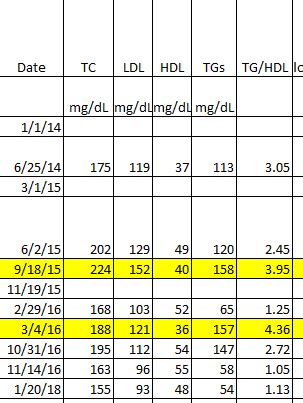Thanks for the replies, guys. A bit more background information would obviously be helpful.
First of all, I started keto not to lose weight but to attain the myriad other health benefits associated with it. Ironically, I first read about it when searching for a solution to my chronically “high” cholesterol, which has hovered around 220 total for the last 10 years (40 HDL, 150 LDL, triglycerides between 120 and 160).
I used to be quite athletic but in recent months I’ve become quite sedentary due to work commitments, although I do typically clock over 10,000 steps per day according to my fitbit.
I’ve lost a significant amount of weight since starting keto, but I haven’t tracked it since weight-loss wasn’t my goal. Most of my pants are far too big now, and I’d guess I’ve lost a good 3-4 inches of waistline. I hadn’t even realized the excess fat was there…
Weight-loss was most pronounced during the first month of the diet but has stabilized in recent weeks.
I tracked my consumption meticulously during the first month using Cronometer, but haven’t done so for the past month as I felt I’d developed a good sense of what I could and couldn’t eat.
My target macros (based on the Perfect Keto calculator) 2,300 total calories, with 128 grams of protein, 193 grams of fat, and 30 grams of net carbs. I would say in the last month my fat consumption has probably dropped while protein has increased, but I check my glucose and ketones regularly and both remain at healthy levels (glucose ranges between 80 and 100, ketones usually between 1 and 3).
As far as foods, my typical day goes like this:
Breakfast: 4 boiled eggs, an avocado, and 1 tablespoon of coconut oil in my coffee.
Lunch: 100 gram portion of beef or chicken, bowl of broth, salad with olives, walnuts, and olive oil. Another cup of coffee with coconut oil.
Dinner: Usually the same as lunch, minus the coffee.
Snacks: Walnuts, pecans, olives as needed. Small quantities of cheese from time to time, but I suspect I may have a dairy intolerance.
Two immediate tweaks I think I can make are to add more salmon, mackerel and sardines to my diet, and eliminate the coconut oil from the coffee.
Fortunately, I had a number of blood tests done in addition to cholesterol. Everything appears to be normal apart from Alkaline Phosphatase, which may be down as a result of the vitamin D supplement I take. Just a guess.
Bilirubin 0.9 mg/dl
Alk Phosphatase 39 IU/l
AST (SGOT) 21 IU/l
ALT (SGPT) 31 IU/l
Sodium 138 mEq/L
Potassium 4.8 mEq
Chloride 102 mEq
Carbon Dioxide 26 mEq
Magnesium 1.9 mg/dl
Iron 98 ug/dl
Total Iron Binding Capacity 269 ug/dl
Iron saturation 36%
BUN 16 mg/dl
Creatinine 1 mg/dl
Ferritin 171 ng/ml
TSH 2.12 uIU/ml
That’s probably too much information, but any additional insight would be greatly appreciated.
Thanks again!

